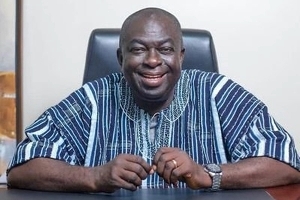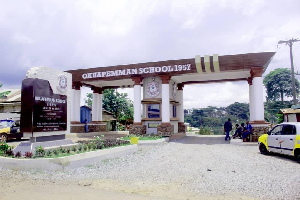General News of Thursday, 16 January 2003
Source:
Junior military officers to act on orders with caution
Ex-Corporal James Zoogah, a former military officer has suggested to junior officers in the military and Para military organizations to act on orders from their superiors with circumspection.
He said though it was a military norm not to question orders from superiors, junior officers would do best to treat people they were asked to discipline humanely to avoid infringing on the personal freedoms and human rights.
Zoogah made the suggestion on Wednesday when he appeared before the National Reconciliation Commission (NRC) on the second day of the Commission's public hearing in Accra.
Zoogah said torture, detention, beatings and other human rights abuses the military committed during unconstitutional regimes could have been avoided if junior officers had acted with circumspection on the orders they received from the superiors.
Answering a question from Uborr Dalafu Labal II, a member of the Commission, on what could be done to avoid torture as a form of punishment in the service, Zoogah said senior officers must also consider the kind of instructions they give, for anybody, whether an officer, could also be a victim of circumstances.
He also called for institutional reforms within the prisons and said the practice of keeping glittering lights on for prisoners to watch needed to be reconsidered. Ex-corporal Zoogah told the Commission that he was picked up by operatives of the Bureau of National Investigation (BNI) on 12 October 1989 while on duty while acting as sergeant at the Military Police Headquarters in Accra and was sent to the BNI headquarters.
He said he was taken to the Counter Espionage Service (CES) in the BNI and was interrogated by a panel including Peter Nanfuri, the former Director of the BNI and Inspector General of Police (IGP) of conspiring with Major (rtd) Courage Quashigah and others to plot a coup to overthrow the then government of the Provisional National Defence Council (PNDC).
Ex Corporal Zoogah said when he told the panel of his innocence, he was whipped and sent to Cell One of the CES. "I was blindfolded, totally beaten and my manhood was pulled. I was hit in the left eye."
He said he was asked if he had heard of the death of Flt Lt Dormi, and he said yes. Ex-corporal Zoogah said he was threatened with death if he failed to tell the truth. He said he told the panel that he would rather die alone than commit other people in crimes they are innocent of.
Ex-Corporal Zoogah said he was sent back again to the CES, and for four times he was picked out at midnight, blindfolded and sent out to unknown places and beaten up along with others.
From the BNI, Ex Corporal Zoogah said he was sent to Usher Fort Prison and was made to eat, bath and go to toilet in the same cell at the Akuse cells for three months. "I felt sick, and when I was under an armed escort to the hospital, a relative was surprised to see me at the hospital. He approached me and whispered to me that my little daughter was dead. I pleaded with the escort to let me see the corpse of my dead daughter, but I was refused."
Ex Corporal Zoogah said he was transferred to Ho Prisons, and one of his wives, now deceased was never told that he had been transferred to Ho Prison when she came on a visit at the Usher Fort Prison.
He said when his wife got to know of the transfer and took a cheque for him to sign to withdraw some money, the prison officer stamped the cheque with the stamp of the Prison Service, making the cheque, which he tendered in evidence to the Commission, invalid.
He said fortunately the wife was having other blank cheques and after insisting that the officer gave the wife a lorry fare for her return to Accra, which he said he never did, he signed another cheque for the wife.
"I underwent an operation during my detention, and despite the operation, I was chained to the bed on which I laid." Ex Corporal Zoogah said, in all he spent a total of more than two years in detention without any specific charge apart from the interrogation.
He said when he was released, he stayed in the barracks, without any official assignment, but was paid until his release from the Service, which under normal circumstances should have been discussed thoroughly with him, was published, and was given 500,000 cedis release money.
Ex Corporal Zoogah said he was subjected to watching a glittering light, which was on for one month day and night when he was in the BNI cells, and as a result, he now suffers blurred vision. He cannot also hear well in his left ear.
"I have forgiven everybody. I give everything to Almighty God, but I can never forget." "I was discharged wrongly, and my mates and junior far below me are all now ahead of me. I will be happy, if I will be allowed to serve for just one day to get my pension to take good care of my five children.
General Emmanuel Erskine, expressed sympathy with Ex-Corporal Zoogah, and stressed that one of the roles of the Commission was to see how best it could restructure certain institutions to prevent recurrence of human rights violations by certain institutions.
He said such reforms would keep institutions like the military and people in authority within their constitutional duties. Earlier Samuel Dwira, 71, now an estate agent, and a former executive member of the Ashaiman Branch of the Progress Party in Accra, told the Commission of his arrest by one policeman and two civilians and subsequent brutalisation and detention in 1972, following the arrest of Bruce Konuah, the then Minister of Housing.
Dwira said for one year at the Nsawam Prison, along with one Iddi, and Issaka Frafra, who became blind before his death, he was exposed to constant light and what he called "poor diet" of kenkey and as result developed a defect in the left eye. He prayed the Commission to help him restore his sight and provide him with a form of compensation before his death.












